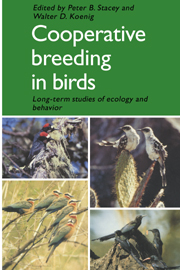Book contents
- Frontmatter
- Contents
- Contributors
- Introduction
- 1 Splendid Fairy-wrens: demonstrating the importance of longevity
- 2 Green Woodhoopoes: life history traits and sociality
- 3 Red-cockaded Woodpeckers: a ‘primitive’ cooperative breeder
- 4 Arabian Babblers: the quest for social status in a cooperative breeder
- 5 Hoatzins: cooperative breeding in a folivorous neotropical bird
- 6 Campylorhynchus wrens: the ecology of delayed dispersal and cooperation in the Venezuelan savanna
- 7 Pinyon Jays: making the best of a bad situation by helping
- 8 Florida Scrub Jays: a synopsis after 18 years of study
- 9 Mexican Jays: uncooperative breeding
- 10 Galápagos mockingbirds: territorial cooperative breeding in a climatically variable environment
- 11 Groove-billed Anis: joint-nesting in a tropical cuckoo
- 12 Galápagos and Harris' Hawks: divergent causes of sociality in two raptors
- 13 Pukeko: different approaches and some different answers
- 14 Acorn Woodpeckers: group-living and food storage under contrasting ecological conditions
- 15 Dunnocks: cooperation and conflict among males and females in a variable mating system
- 16 White-fronted Bee-eaters: helping in a colonially nesting species
- 17 Pied Kingfishers: ecological causes and reproductive consequences of cooperative breeding
- 18 Noisy Miners: variations on the theme of communality
- Summary
- Index
16 - White-fronted Bee-eaters: helping in a colonially nesting species
Published online by Cambridge University Press: 07 September 2010
- Frontmatter
- Contents
- Contributors
- Introduction
- 1 Splendid Fairy-wrens: demonstrating the importance of longevity
- 2 Green Woodhoopoes: life history traits and sociality
- 3 Red-cockaded Woodpeckers: a ‘primitive’ cooperative breeder
- 4 Arabian Babblers: the quest for social status in a cooperative breeder
- 5 Hoatzins: cooperative breeding in a folivorous neotropical bird
- 6 Campylorhynchus wrens: the ecology of delayed dispersal and cooperation in the Venezuelan savanna
- 7 Pinyon Jays: making the best of a bad situation by helping
- 8 Florida Scrub Jays: a synopsis after 18 years of study
- 9 Mexican Jays: uncooperative breeding
- 10 Galápagos mockingbirds: territorial cooperative breeding in a climatically variable environment
- 11 Groove-billed Anis: joint-nesting in a tropical cuckoo
- 12 Galápagos and Harris' Hawks: divergent causes of sociality in two raptors
- 13 Pukeko: different approaches and some different answers
- 14 Acorn Woodpeckers: group-living and food storage under contrasting ecological conditions
- 15 Dunnocks: cooperation and conflict among males and females in a variable mating system
- 16 White-fronted Bee-eaters: helping in a colonially nesting species
- 17 Pied Kingfishers: ecological causes and reproductive consequences of cooperative breeding
- 18 Noisy Miners: variations on the theme of communality
- Summary
- Index
Summary
The evolution of cooperative breeding is a topic of considerable interest among evolutionary biologists. The reason is that helping behavior at first glance appears to be altruistic – that is, the behavior benefits other individuals (the recipient breeders and their offspring), while entailing a cost to the donor (the helper). As such, the forgoing of breeding and participation in helping poses an evolutionary paradox, since it appears to contradict the fundamental theorem of individual natural selection.
The production of this volume attests to the collective interest of ornithologists in this topic. Some contributors were drawn to their studies by an inherent interest in complex avian societies; others were drawn by the challenge of finding an answer to the puzzle of altruism. Whatever the reasons, the last decade has seen a surge of empirical studies on cooperatively breeding species. And, along with the increase in field data, have come the beginnings of a general unified theory for the evolution of avian helping.
The emerging solution to the paradox of helping behavior is best viewed as a two-step process (Brown, 1974, 1987; Emlen 1982a, 1984; Emlen and Vehrencamp 1983). We should ask two questions: ‘why don't all individuals breed on their own?’, and ‘why do non-breeders often become helpers?’. The answer to the first in many cases seems to be that they cannot – that various constraints exist which either prevent them from attaining breeding status or which raise the costs of independent breeding to prohibitive levels, thereby favoring a postponement of reproduction.
- Type
- Chapter
- Information
- Cooperative Breeding in BirdsLong Term Studies of Ecology and Behaviour, pp. 487 - 526Publisher: Cambridge University PressPrint publication year: 1990
- 26
- Cited by



